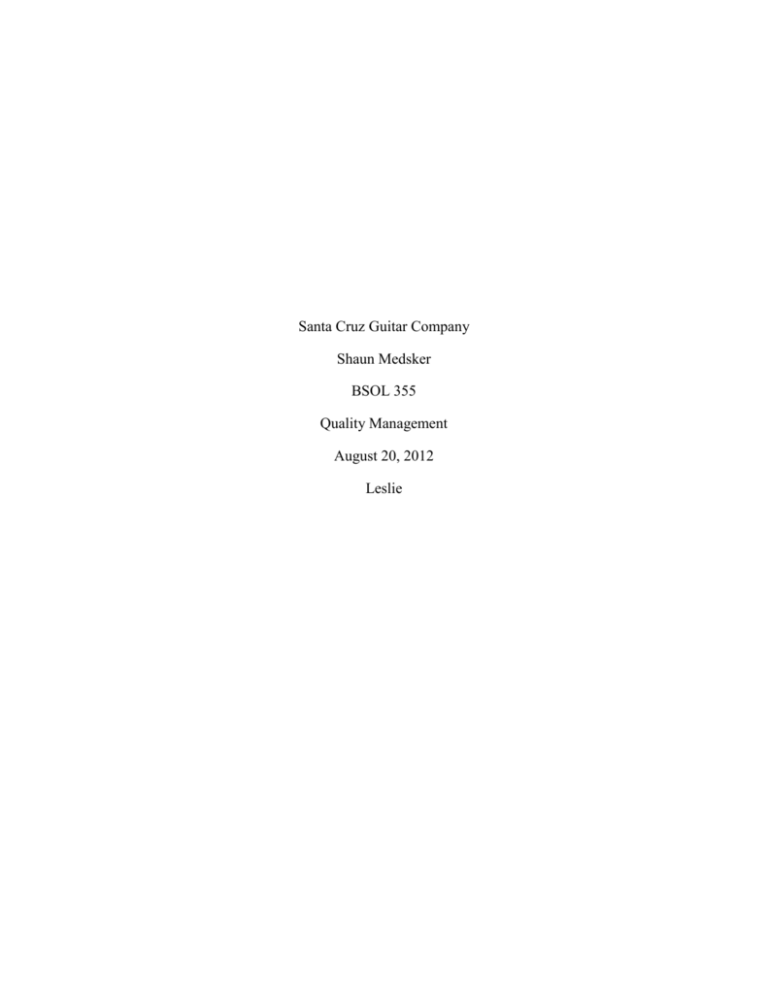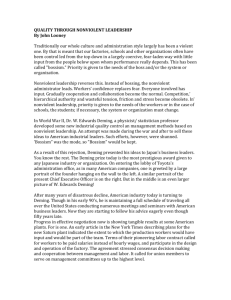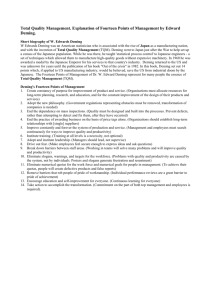File - Managerial Methods
advertisement

Santa Cruz Guitar Company Shaun Medsker BSOL 355 Quality Management August 20, 2012 Leslie Dr. W. Edwards Deming is one of the godfathers of modern quality. Through him and others work quality was changed around the globe (Evans and Lindsay, 2011). One of the methods that Deming used to improve quality was establishing his 14 Points. Santa Cruz Guitar Company (SCGC) shows several of Deming’s 14 Points despite not having a formal quality department (Evans and Lindsay, 2011). One of the first practices at SCGC that reflects one of Deming’s points is SCGC luthiers are encouraged to enhance their skills and try to find better ways to operate. This goes in line with Deming’s 1st Point: Create a Vision and Demonstrate Commitment. Although Deming’s point can also mean that a business’ purpose is to serve customers and provide the community with jobs (Evans and Lindsay, 2011), I believe this practice applies here as well. Allowing employees to experiment with new techniques to become more efficient in building shows a commitment to long-term sustainability and opportunity for personal growth. Another method that applies Deming’s 4th point is SCGC only using the highest grades of tonewoods and forming the wood by hand, rather than by machine (Evans and Lindsay, 2011). The 4th point is to Stop Making Decisions Purely on the Basis of Cost. One way to apply Deming’s point is to reduce your number of suppliers; therefore, reducing setup cost, volume discounts, and the likelihood of variation; but, it can also be applied to achieving the highest possible quality of product, despite the increased cost. According to their website, SCGC feels that the wood they use is superior to the wood of their competitors because it is naturally aged and comes from the best suppliers in the world. SCGC chooses to heat the wood and bend it by hand rather than machine because the wood is more likely to hold its shape, which increases tonal and overall quality (Evans and Lindsay, 2011). One of the most important points of emphasis in Deming’s 14 Points is Improve Constantly and Forever. Improvements in operations are accomplished by “engaging all employees to innovate and seek ways of doing their jobs more efficiently and effectively”, which is exactly what SCGC does (Evans and Lindsay, 2011, p. 101). Each luthiers at SCGC writes down what they did while building the top of the guitar, and after final assembly and the guitar is played the luthiers is notified of the quality of the sound (Evans and Lindsay, 2011). If the sound is exceptional, the luthier checks his or her notes so the process can be duplicated. The Santa Cruz Guitar Company also applies the principles of Deming’s 12th and 13th points by allowing employees to build 2 instruments per year for their personal use, encouraging additional external training and encouraging the luthiers to open their own business (Evans and Lindsay, 2011). Deming’s 12th Point is Remove Barriers to Pride in Workmanship and the 13th is Encourage Education and Self-Improvement. Allowing employees to build 2 instruments per year creates pride because the workers will care about something they are making for themselves. In turn, they will be more likely to think outside of the box for what they want, and improve processes. This point is also emphasized by only hiring people who are passionate about the guitar-making business. SCGC highlights self-improvement through training and encouraging workers to start their own business. Training allows employees to broaden their job-specific skill-set and also keeps the individual motivated to keep improving (Evans and Lindsay, 2011). Encouraging luthiers to master their craft and then start their own business can also benefit the company. The luthiers would be passionate and talented and could make a difference at SCGC in their time there. References Evans, J. R., & Lindsay, W. M. (2011). Managing for quality and performance excellence (8th ed.) Cengage Learning.







